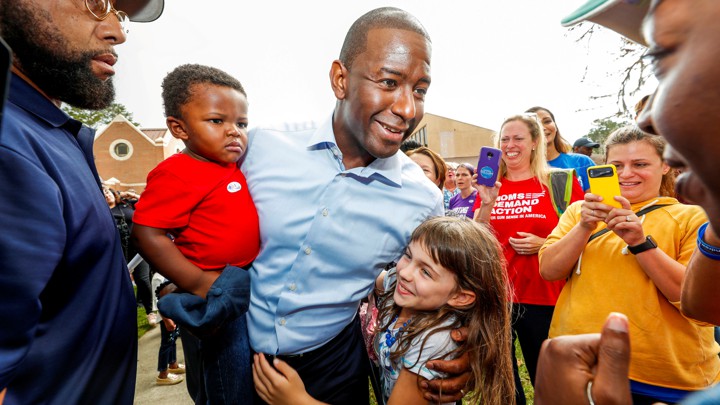America's Problem Isn't Tribalism—It's Racism
It’s fashionable in the Donald Trump era to decry political “tribalism,” especially if you’re a conservative attempting to criticize Trump without incurring the wrath of his supporters. House Speaker Paul Ryan has lamented the “tribalism” of American politics. Arizona Senator Jeff Flake has said that “tribalism is ruining us.” Nebraska Senator Ben Sasse has written a bookwarning that “partisan tribalism is statistically higher than at any point since the Civil War.”
In the fallout from Tuesday’s midterm elections, many political analysts have concluded that blue America and red America are ever more divided, ever more at each other’s throats. But calling this “tribalism” is misleading, because only one side of this divide remotely resembles a coalition based on ethnic and religious lines, and only one side has committed itself to a political strategy that relies on stoking hatred and fear of the other. By diagnosing America’s problem as tribalism, chin-stroking pundits and their sorrowful semi-Trumpist counterparts in Congress have hidden the actual problem in American politics behind a weird euphemism.
Take Tuesday’s midterm elections. In New York’s Nineteenth Congressional District, the Democrat Antonio Delgado, a Harvard-educated, African American Rhodes scholar, defeated the incumbent Republican John Faso in a district that is 84 percent white, despite Faso caricaturing Delgado as a “big-city rapper.” In Georgia, the Republican Brian Kemp appears to have defeated the Democrat Stacey Abrams after using his position as secretary of state to weaken the power of the black vote in the state and tying his opponent to the New Black Panther Party. In Florida, the Republican Ron DeSantis defeated the Democrat Andrew Gillum after a campaign in which DeSantis’s supportersmade racist remarks about Gillum. The Republican Duncan Hunter, who is under indictment, won after running a campaign falsely tying his Democratic opponent, Ammar Campa-Najjar, who is of Latino and Arab descent, to terrorism. In North Dakota, Democratic Senator Heidi Heitkamp lost reelection after Republicans adopted a voter-ID law designed to disenfranchise the Native American voters who powered her upset win in 2012. President Trump spent weeks claiming that a caravan of migrants in Latin America headed for the United States poses a grave threat to national security, an assessment the Pentagon disagrees with. In Illinois on Tuesday, thousands of Republicans voted for a longtime Nazi who now prefers to describe himself as a “white racialist”; in Virginia, more than a million cast ballots for a neo-Confederate running for Senate.
A large number of Republican candidates, led by the president, ran racist or bigoted campaigns against their opponents. But those opponents cannot be said to belong to a “tribe.” No common ethnic or religious ties bind Heitkamp, Campa-Najjar, Delgado, or the constituencies that elected them. It was their Republican opponents who turned to “tribalism,” painting them as scary or dangerous, and working to disenfranchise their supporters.
The urgency of the Republican strategy stems in part from the recognition that the core of the GOP agenda—slashing the social safety net and reducing taxes on the wealthy—is deeply unpopular. Progressive ballot initiatives, including the expansion of Medicaid, anti-gerrymandering measures, and the restoration of voting rights for formerly incarcerated people, succeeded even in red states. If Republicans ran on their policy agenda alone, they would be at a disadvantage. So they have turned to a destructive politics of white identity, one that seeks a path to power by deliberately dividing the country along racial and sectarian lines. They portray the nation as the birthright of white, heterosexual Christians, and label the growing population of those who don’t fit that mold or reject that moral framework as dangerous usurpers.
The Democratic Party, reliant as it is on a diverse coalition of voters, cannot afford to engage in this kind of politics. There are no blue states where Democrats have sought to make it harder for white men without a college education to vote, even though that demographic typically votes Republican. Democratic candidates did not attack their white male opponents as dangerous because four white men carried out deadly acts of right-wing terrorism in the two weeks prior to the election. Democratic candidates for statewide office did not appeal to voters in blue states by trashing other parts of the country considered to be conservative. Democratic candidates who ran for office did not advertise their willingness to use state violence against groups associated with Republican constituencies.
I am not arguing that the Democratic Party or its members are particularly virtuous. A little more than a century ago, it was the Republican Party that was reliant on a diverse coalition of voters, and the Democratic Party that rode white rage to power. Rather, I am saying that when a party’s viability is dependent on a diverse coalition of voters, that party will necessarily stand for pluralism and equal rights, because its survival depends on it. And when a party is not diverse, it will rely on demonizing those who are different, because no constituency exists within that party to prevent it from doing so, or to show its members that they have nothing to fear.
In the Trump era, America finds itself with two political parties: one that’s growing more reliant on the nation’s diversity, and one that sees its path to power in stoking fear and rage toward those who are different. America doesn’t have a “tribalism” problem. It has a racism problem. And the parties are not equally responsible.
We want to hear what you think about this article. Submit a letter to the editor or write to letters@theatlantic.com.


No comments:
Post a Comment